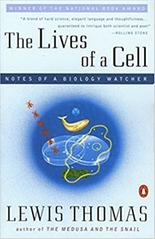 Between 1971 and 1973, physician Lewis Thomas wrote monthly essays for the New England Journal of Medicine. In 1974, those 29 essays were collected in The Lives of a Cell: Notes of a Biology Watcher, a landmark of eloquent, accessible science writing that won the National Book Awards for Arts and Letters and the Sciences in 1975. Thomas (1913-1993) expanded an already impressive career as dean of Yale Medical School and New York University School of Medicine, and president of Memorial Sloan-Kettering Institute, into bestselling author. He went on to publish The Medusa and the Snail: More Notes of a Biology Watcher (1979), which also won the National Book Award for the Sciences, Late Night Thoughts on Listening to Mahler's Ninth Symphony (1983), The Youngest Science: Notes of a Medicine-Watcher (1983), Et Cetera, Et Cetera: Notes of a Word-Watcher (1990) and The Fragile Species (1992).
Between 1971 and 1973, physician Lewis Thomas wrote monthly essays for the New England Journal of Medicine. In 1974, those 29 essays were collected in The Lives of a Cell: Notes of a Biology Watcher, a landmark of eloquent, accessible science writing that won the National Book Awards for Arts and Letters and the Sciences in 1975. Thomas (1913-1993) expanded an already impressive career as dean of Yale Medical School and New York University School of Medicine, and president of Memorial Sloan-Kettering Institute, into bestselling author. He went on to publish The Medusa and the Snail: More Notes of a Biology Watcher (1979), which also won the National Book Award for the Sciences, Late Night Thoughts on Listening to Mahler's Ninth Symphony (1983), The Youngest Science: Notes of a Medicine-Watcher (1983), Et Cetera, Et Cetera: Notes of a Word-Watcher (1990) and The Fragile Species (1992).
The Lives of a Cell combines an enormous range of scientific disciplines into a holistic view of Earth and humankind's place on the planet. Each essay uses as much metaphor as hard fact to present a given issue, such as the titular "The Lives of a Cell," in which Thomas compares the symbiotic relationship between us and the mitochondria in ours cells with humanity and the Earth itself, or "Antaeus in Manhattan," which examines the behaviors of groups versus individuals in insect and human societies. The Lives of a Cell is ranked 11th in the Modern Library's 100 Best Nonfiction books of the 20th century, has sold more than 250,000 copies, and is available from Penguin Books ($16, 9780140047431). --Tobias Mutter

